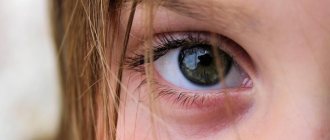Home / Children / Kids
Back
Published: 01/13/2021
0
585
In the process of raising a child, the number of parental problems does not decrease, but increases as the child develops. We have not had time to cope with poor appetite or a viral infection, but we have already noticed that night rest has worsened or the child sleeps with his eyes slightly open. At an early age, the scientific community tends to consider this normal. There is a natural explanation for this, and it lies in the period of formation of systems and relationships.
Their incompleteness during the period of intrauterine development, the peculiarities of children's sleep during the formation of the nervous system, make such uncharacteristic manifestations quite acceptable. Most plausible and harmless explanations for why a child sleeps with his eyes half open lose their credibility as soon as he moves from one age stage to another.
Against this background, there is reason to suspect certain pathologies and causes of eyes open in sleep. And, accordingly, seek medical help. Sometimes this is a harmless phenomenon, but more often it poses a threat to the child’s health.
- 1 Probable etiology of the disorder
- 2 The mechanism of children's sleep
- 3 The most likely causes of the violation
- 4 Diagnosis and reliable cause of violations
- 5 TOP 10 tips on how to improve your night's rest
Peculiarities
The sleep stages of a baby are very different from those of an adult because babies under three months of age do not produce enough melanin.
Like a mature person, a baby has two phases: fast or superficial and slow - deep.
During the slow period, the child’s brain and nervous system rest completely. Slow, even breathing begins.
During the fast phase, the brain and nerve endings work in the same mode, processing and analyzing information. During this stage, babies dream.
These phases very quickly replace one another; during this period of time, children often shudder, move their fingers, clench their fists, and mutter. Their eyeballs also rotate; their eyes may not be closed or not closed completely.
Pediatricians consider this to be the norm. Such manifestations should disappear by the age of one and a half years.
During light naps, babies often sleep with their eyelids slightly open. Moving into the phase of long, sound sleep, the eyelids close on their own.
The human brain is still poorly understood, so experts find it difficult to name the specific source of this condition. One thing is clear that this behavior does not pose a threat or deviation from the norm and goes away on its own up to a maximum of two years.
Why does a child sleep with his eyes open?
After the birth of their first child, many parents wonder why the child sleeps with his eyes open. This phenomenon does not indicate any abnormal abnormalities in the baby, but occurs for some minor reasons, which parents should not worry about under any circumstances. But in order to dispel fears, it is worth delving into the origins of this phenomenon and finding out the reasons.
The child sleeps with his eyes open
Sleep is a process that is still not fully studied by scientists, but many moments have been recorded using special devices. In order to find out the details, it is worth understanding exactly how the baby falls asleep and what happens at this moment.
The process itself can be divided into two components, that is, 2 phases:
- the fast phase or, in other words, the superficial phase is a short-term process during which the baby’s body prepares to rest;
- the deep phase occurs after the previous one, after which all the muscles of the body relax, and even breathing will indicate that the child has fallen asleep.
It is during the process when babies fall into the REM sleep phase that unconscious movements occur or eyes are observed to be slightly open. But in a couple of minutes this will pass, and the child will plunge into the world of sleep, after which the parents will be able to relax and calm down.
Other reasons
Sometimes there may be exceptions that indicate that parents should be interested in the baby's health. Do not panic; it is recommended to consult a doctor and find out the exact causes of this phenomenon.
Why does a child sleep with his eyes slightly open? The reasons may be the following:
- somnambulism;
- predisposition passed on from parents;
- lagophthalmos;
- mental stress.
If the baby’s parents were also exposed to this phenomenon, then there is no reason to worry, since everything will pass in a year and a half, after which the baby’s sleep will finally return to normal.
Lagophthalmos in children
This phenomenon may occur for several reasons, namely:
- A predisposition transmitted through genes.
- Dysfunction of the nervous system.
- Disturbed innervation.
If this process continues after reaching the age of two or is observed more than twice a week, then an alarm bell should ring for parents.
The cause of slightly open eyes may be an ophthalmic disease called lagophthalmos. With this diagnosis, there is no need to fear that the child’s sleep functions are disturbed, and it can last from a year to two.
Sleepwalking in babies
Some parents may observe their sleeping children, who have reached the age of two, have completely open eyes, which may indicate a phenomenon such as sleepwalking. With such an illness, people can perform unconscious actions, talk, even have a conversation, without breaking away from sleep itself. For a two-year-old child, this process can last just under an hour.
A child suffering from somnambulism may exhibit the following symptoms:
- Incoherent speech in sleep.
- Inability to remember anything that happened.
- Inability to understand what is happening after waking up suddenly.
- Sleeping with eyes slightly open.
- Walking around the room in your sleep.
Somnambulism is dangerous because while children are sleeping and performing actions without realizing it, they can cause some kind of injury to themselves. It's really worth worrying, because there have been cases where people have fallen from the roofs of houses or injured themselves without realizing it.
If you detect any of the above signs, you should not panic and scare the child and yourself, because this can leave an imprint on the psyche, which will affect his future. It is strongly recommended to consult a doctor, whose objective solution will help parents deal with this problem. A prescription may be issued that requires taking sedative pills or simple measured rest, if the causes of these disorders are psychological.
But it may also turn out that the fears were unfounded, and the child is healthy, and parents can now sleep peacefully without worrying about their baby’s sleep.
sonoved.ru
Causes
Doctors emphasize four main factors for open eyelids in infants: overwork, sleepwalking or sombulism, lagophthalmos, and heredity.
Overwork, overstrain
Sleeping with open eyelids can be a factor in the child's overtiredness or overexertion, or caused by severe overexcitation. As a rule, this happens extremely rarely.
Brain cells become overworked, and the eyelids do not close completely.
But, in addition to unclosed eye sockets, other accompanying symptoms are added here:
- flinch;
- sobbing;
- twitching of limbs.
Sleepwalking
Sleepwalking or sombulism is a disease of a neuralgic nature.
A similar condition can be observed after illness.
Sombulism can be short - a few minutes, or long-lasting.
This disease develops after two years of life. During the period of night rest, the child can get up, talk, and walk around the room.
After waking up, he does not remember where he was or what he did. At such times, it is recommended:
- talk quietly calmly;
- do not jerk the child or make noise;
- put him to bed, trying not to wake him.
There are examples of children suffering from sleepwalking falling from a window or roof. Therefore, at the slightest suspicion of sombulism, examination in a clinic is necessary.
If cases are detected, vigilant supervision at night is necessary.
In such cases, the doctor will prescribe a series of studies. Electroencephalogram of the brain, as well as Dopplerography. An ophthalmologist or optometrist will examine the eyeball.
The disorder does not have a hereditary predisposition. This is more of an acquired pathology. It usually goes away with age.
Lagophthalmos
Unclosed eyelids may also indicate an ophthalmological pathology - lagophthalmos.
This disease may be associated with a malfunction of the central nervous system or with a congenital defect of the eyelids.
Lagophthalmos does not pose any danger to the little man and goes away on its own after a year.
But if you notice that after a night's rest your baby has increased lacrimation or conjunctivitis, you should urgently seek advice from a specialist.
Heredity
There is also a hereditary predisposition. When mom or dad suffered from a similar problem in early childhood, the child is likely to experience the same problem again. But this is optional.
There is no reason to worry. By the year of life, everything should pass.
Possible diseases
If, in addition to slightly open eyes, there are also accompanying symptoms, it’s worth thinking about.
Constantly open eyes during night rest may indicate neuralgic or mental abnormalities.
Possible disease of the central nervous system or brain disease. Eyelid defects or pathological damage to the fundus.
In order not to miss and prevent the development of more complex diseases, a consultation with a pediatrician is necessary.
He will listen to complaints, identify symptoms, conduct an examination and, if necessary, refer you to specialized specialists for diagnosis.
Somnambulism
Another reason why children sleep with half-open eyelids is a disease called somnambulism. People call this disease more simply: sleepwalking. Children suffering from this disease can sleep with their eyes open, talk, get up in their sleep and walk around the apartment, performing incomprehensible and illogical actions, for example, hiding or rearranging things. Somnambulism is observed in children after six years of age. The duration of sleepwalking ranges from one minute to a full hour, and in some cases longer. When children wake up in the morning, they do not remember anything about the night's adventures or conversations.
The main danger of sleepwalking is the possibility of injury to the child. Since the child sleeps with his eyes half open and unconsciously gets out of bed, starting to walk and talk, he can inadvertently injure himself by hitting a corner or piece of furniture.
Unfortunately, there are cases where babies, suffering from somnambulism, fell down stairs at night, fell out of windows, or were seriously injured in other ways.
The worst thing about sleepwalking is the lack of awareness of a person’s actions. The sleeping person can get up and, wearing slippers, go out of the house onto the roadway.
If your little miracle is prone to sleepwalking, then this problem cannot be left to chance. It is worth contacting a specialist. Somnambulism jeopardizes not only your child’s health, but also his life.
Treatment options
If you notice that your child periodically sleeps with his eyes open, you should consult a doctor. At the appointment, the specialist will ask you whether there have been any acute negative emotions or memories in the baby’s life recently, whether the baby has suffered any serious illnesses, and if so, what and when. If mommy remembers everything reliably, then the doctor will prescribe appropriate treatment or refer her for examination to other specialists.
Sleepwalking is treated by doing the following:
- Before going to bed, the child should have a relaxing massage using vegetable oil (almond or olive). It is also possible to add a small amount of essential oil, which has a calming effect on the child’s psyche (lavender or mint).
- If the baby is overstressed or overly excited, it is recommended to give herbal decoction to drink. Brew mint, motherwort or valerian and give it to your offspring throughout the day.
- In your son or daughter’s room, you can hang herbs in a bag above the bed.
- Parents should monitor their child more closely and pay attention to how much their child sleeps. After all, if the baby overexerts himself and sleeps poorly (little), then this state of affairs can develop somnambulism.
- If massage and soothing herbs do not give the desired result, the doctor may prescribe sedatives or sleeping pills. In especially severe cases, tranquilizers are prescribed.
Contacting specialists
If you are concerned about the state of your offspring's sleep, you observe periodic or frequent sleepwalking in him, then you should consult a specialist. But which doctor should I make an appointment with? After all, no one wants to simply waste their precious time.
So, in solving the problem of sleeping with your eyes open or sleepwalking, you will be helped by:
- children's pediatrician;
- ophthalmologist;
- neurologist;
- neuropsychiatrist.
First of all, you should contact your pediatrician. At your doctor's appointment, talk about your observations and express your concerns. If the doctor decides that the problem is serious, he will refer you and your baby to highly specialized doctors, such as a neurologist or an ophthalmologist. When you come to see these specialists, feel free to talk about your problem. The more your doctor knows, the faster he can help you.
If there have been recent negative shocks in your family life or in the life of your baby, your pediatrician will most likely refer you and your child to a neuropsychiatrist for further treatment of somnambulism.
Manifestation at different ages
Very small babies under the age of one and a half years often sleep with their eyelids half open. This is not a sleep disorder.
Among children over two years old, sleeping with half-open eyes is less common than among infants. However, do not rush to panic. Perhaps your child is simply overtired during the day, and his nervous system is overexcited. Have a relaxing massage before bed. If you notice sleeping with your eyes open on a regular basis, contact your pediatrician.
If your child is over six years old, and his sleep is restless, with his eyes open, or the child sleepwalks (unconsciously gets up in the middle of the night and walks), then make an appointment with a specialist to solve this problem. Remember, sleepwalking puts a person’s health and life at risk.
When you need help
If, after two years, children continue to sleep with their eyelids slightly open or with their eyelids open, this situation repeats frequently and the frequency increases, you should consult your doctor.
This may be due to underdevelopment of the eyelid, or to a neuralgic disorder.
It will be necessary to undergo a full examination and therapy by a pediatric neurologist.
The child's psyche is quite unstable. Nowadays, the baby is surrounded by a huge number of irritating factors.
- Bright irritating light for a long time.
- Working TV.
- Sharp dynamic music.
- Raised voices from parents.
- Telephone.
- Loud toys.
Children become hyperactive or emotionally unstable.
Moreover, the psycho-emotional state can be influenced not only by negative, but also by positive emotions.
In order not to guess about the health of your baby, it is better to consult a doctor. His conclusion will help you figure out whether there is cause for concern.
Why does a child sleep with his eyes slightly open?
Many mothers begin to worry when they see that the child is sleeping with his eyes slightly open. Such a dream is a dream for many students, office workers and military personnel who are on guard. In this case, the problem with lack of sleep was immediately solved.
According to studies, it was found that a person will be able to sleep anyway, since some parts of the brain will be able to “fall asleep” even if the entire body is awake. This strategy has not been fully researched, and therefore the only way to stay awake for several days.
With this option, adults and children fall asleep in any position and environment. For many patients, such experiments pose a threat, since spontaneous sleep can cause bruises, fractures and even accidents.
Why does a child sleep with his eyes half open? What features can you highlight? When should parents worry? Answers to these and more questions can be found below. Why is this happening?
Sleeping with half-open eyes
Sleeping with your eyes slightly open is not a myth. Many parents could encounter a similar phenomenon while watching their baby. If a child is sleeping and his eyes are slightly open, then parents may have some concerns. In any case, this condition does not seem entirely normal.
As a rule, sleeping with your eyes half open does not pose any danger. It can be explained from a scientific point of view through the physiological norms of child development.
Lagophthalmos is a phenomenon in which a toddler sleeps with his eyelids open. Often it does not cause sleep disturbances. According to research by scientists, it was found that most of the time a newborn is in the active stage of sleep, and therefore the eye sockets begin to roll back, opening the eyelids themselves.
There are no problems with this option, and parents should not worry. For simplicity, you can close your eyelids yourself, and the baby will not wake up. After 12-18 months, the baby will no longer “scare” its parents.
Babies also sleep after 18 months if they have experienced a series of nervous arousals during the day.
The brain cells are overstrained, and therefore the eyelids cannot close normally. Such a dream is characterized by other distinctive features: screaming, restlessness, twitching. If this condition continues after 1.5 years, then it is necessary to establish the true cause. A young patient may experience underdevelopment of the eyelid and other neurological symptoms.
What should I do?
If your baby does not close his eyelids during sleep, you should seek help from an ophthalmologist. During a diagnostic study, it is possible to determine the condition of the eyeball and, if a disease is detected, prescribe an effective treatment regimen. As a result of the examination, it is advisable to visit a neurologist, since such a dream signals ongoing neurological changes.
In some patients, this problem disappears with age. It does not require any additional treatment. In any case, consultation with a specialist will only be beneficial. The sooner the problem is detected, the faster the cause of the disorder can be eliminated.
A toddler's sleep is often disturbed after severe emotional stress - crying or having fun.
To prevent this problem, parents should create a special bedtime routine: reading a favorite book, bathing, drinking warm tea.
The baby should fall asleep at the same time, only in this case will it be possible to avoid further development of the problem. Stress instability often leads to the disorders described above. The main task of both parents is to protect them from any stress and worries. In this case, the toddler will develop quickly and harmoniously.
If the situation does not go away, it is better to consult a doctor. The earlier the diagnosis is made, the less effort will be required to eliminate the negative consequences.
tutmama.ru
How to help
It is not recommended to wake up the baby if he sleeps with his eyes open. This will only disturb his night's rest and prevent him from getting enough sleep.
Because of this, he will be capricious and demanding. You can try to carefully close your eyelids, although there is a great need for this.
If your baby's eyelids not closing are causing you concern, it would be advisable to consult a pediatrician.
The ophthalmologist will prescribe a diagnosis of the eyeball, which will be able to determine the presence or absence of defects and damage.
It would not be superfluous to consult a pediatric neurologist to rule out pathologies of a neuralgic nature.
When it passes
All experts unanimously believe that slightly open eyelids in children under two years of age are considered normal.
- If the phenomenon of open eyelids in a dream is associated with a hereditary predisposition, then such an ailment disappears by the age of one year.
- If it is due to overwork or overexcitation, it will go away immediately after eliminating this kind of irritant and creating comfortable, calm conditions for the baby.
- Ophthalmological pathology - lagophthalmos, also does not pose a threat to the body and will disappear on its own by the age of one year.
- Sleepwalking, or somnambulism in scientific terms, manifests itself at a later age of three, and goes up to six to eight years.
see also
- The child falls asleep in my arms and wakes up when I transfer him to the crib
- The child does not sleep well at night and often wakes up
- Why does a child cry after sleep?
- A child talks in his sleep reasons
- Sleep apnea in a child
- Co-sleeping with a child
- Why does a child throw his head back when he sleeps?
- How to put a newborn baby to sleep
- How to get your baby to sleep in his crib
- Changing a child's diaper in a dream
List of sources
- www.deti34.ru
- vremiasna.ru
- vosne.info
- tokfm.ru
- sonsladok.ru
- zason.ru
- spi-moya-radost.ru
- www.nashagrud.ru
Recommendations
In the first days of life, it is difficult for a baby to tune in to our biorhythms, and the parents’ task is to help him with this.
- The first basic rule is to establish and maintain a daily routine. Try to feed and rock your baby at the same time.
- Carry out daily repeating procedures for your child before bedtime. For example, bathing, lullaby, calm music, stroking. This will tell the baby that it is time to sleep.
- The time for rest has already come, but is your baby still active? Keep him busy with a calmer activity so as not to overstimulate him.
- A couple of hours before your night's rest, do not turn on the TV. Its impact negatively affects the baby’s psyche and sleep.
- A daily relaxing massage will help your baby sleep better.
According to statistics, 50% of infants experience similar phenomena. If it is important to you that your baby grows up healthy, provide him with comfortable conditions and a cozy, calm atmosphere at home.











